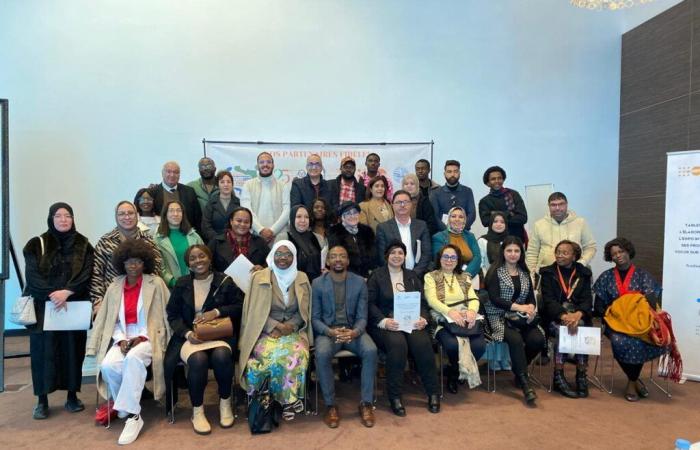
This article was automatically translated from HIBAPRESS, the Arabic version:
Heba Press – Ahmed Al-Musaed
As part of the “Gender Equality and Migrant Issues” program of the city of Nador, in partnership with the United Nations Population Fund (UNFPA), and in cooperation with the National Movement for Girls’ Rights, the The Tisgnas Association for Culture and Development (ASTICUDE) organized Saturday, December 14 in Nador, a series of workshops under the title: “Consultation round tables” on the rights of migrant girls, as part of the activities of the ninth session of the African Intercultural Exhibition.
General context
In Morocco, girls (migrant and Moroccan) constitute an essential pillar in the construction of an inclusive and just society. However, they face challenges linked to gender inequality, gender-based violence, discrimination and socio-cultural norms that limit their full development.
Promoting peaceful coexistence, based on respect for human rights, is essential to enable them to participate effectively in social, economic and cultural life.
Workshop objectives
This workshop made it possible to diagnose and identify the needs, expectations and procedures to follow to arrive at a set of recommendations and suggestions, with the aim of taking them into consideration by the partners when developing a action plan during its next sessions, with a focus on girls’ rights.
The importance of South-South cooperation
This requires strengthening South-South cooperation between actors (Moroccans and sub-Saharan countries), to promote peaceful coexistence and the rights of girls in vulnerable situations in Morocco, and to integrate a systematic and multisectoral response to prevent based violence. on gender and harmful violence. practices against girls, while providing space for dialogue and consultation on strengthening legal frameworks, improving appropriate services and raising community awareness.
The role of cultural pluralism in protecting the rights of girls
How can multiculturalism enrich society at social, economic and cultural levels while strengthening the protection of girls’ rights among Moroccan and sub-Saharan actors on the effectiveness of the rights of girls in vulnerable situations in the face of emerging challenges, and reflect How to strengthen protection mechanisms between countries, in a context characterized by growing challenges? Due to persistent migration and inequalities, it becomes necessary to strengthen the South-South cooperation mechanism to advance the rights of girls in vulnerable situations.
This collaborative approach aims to develop appropriate solutions to the specific problems encountered by migrant or vulnerable girls in their countries of origin, transit or host countries.
An interactive workshop to promote girls’ rights
The workshop, in two groups, discussed the importance of the transfer of knowledge and experience on the issues of combating inequalities, violence and social and sexual discrimination, and the dissemination of good practices between large-scale associations. South/South. The economic contexts between countries of the South offer the opportunity to exchange knowledge, experiences and good practices adapted to local reality.
Given the similarity of Moroccan culture with many African countries, the transfer of knowledge and expertise between associations, institutions and community actors can play a determining role in the fight against disparities, violence and discrimination, by mobilizing and by raising awareness among local stakeholders, by mobilizing decision-makers in public policies, by making them aware of the issues and by involving them in the construction of a map. A clear and achievable path, allowing the implementation of a basic strategy to influence decision-makers and mobilize resources, taking into account local actors (authorities, civil society organizations). , community leaders, educational institutions and the private sector), to provide an appropriate and sustainable response.
Many institutional and non-institutional actors, experts, representatives of non-governmental organizations, advisory bodies and civil society participated in the interactive workshop.





